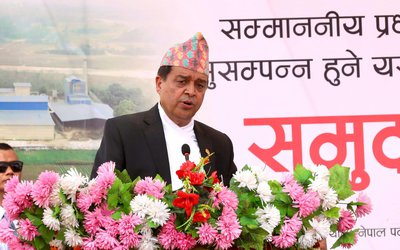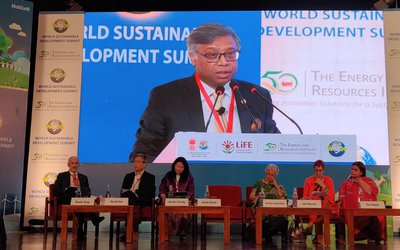
The private sector plays a crucial role in driving economic development, both domestically and globally. In Nepal, it accounts for a significant 81 percent of the national GDP and is responsible for generating around 87 percent of employment opportunities. Through innovation, the adoption of new technologies, business management expertise, entrepreneurship, and efficient allocation of financial and human resources, the private sector contributes to economic growth. These contributions ultimately enhance production and productivity in the market for goods and services.
However, despite these impressive contributions, there is often dissatisfaction and discord among the private sector, government, and consumers. This can lead to a blame game, with the private sector feeling marginalized and unfairly targeted as the sole cause of economic issues. Such conflicts directly hinder the creation of a conducive business ecosystem and environment.
Nepal, despite its small market size for large investments, offers significant strategic market opportunities. These opportunities arise from its close proximity to emerging global markets like India and Bangladesh, as well as its potential as a future business transit route between Nepal and China. The large populations of India and China could also become future markets for the private sector. Globally, there is a growing trend of rising labor costs, coupled with the increasing use of artificial intelligence and robotics in the industrial sector, which directly impacts labor forces in various ways. Compared to countries like Vietnam, the Philippines, and Bangladesh, Nepalese labor costs remain relatively low. Sectors, which include tourism, hydroelectricity, infrastructure, mega projects, outsourcing services, information technology, agriculture, food processing, herbs and medicinal products, as well as the hotel and hospitality industry, hold great potential for investment. Additionally, sectors like medical education, transportation and warehousing, and financial markets, including foreign direct investment, are also promising areas for private sector investment.
Despite the various opportunities available, there are several questions that need to be addressed. Why are private sector entities hesitant to increase their investments? Why is foreign direct investment not growing as expected? Why is our economic diplomacy failing to attract foreign direct investment effectively? Do we have the capability to understand the needs and desires of private investors? Are the overall governmental mechanisms, such as bureaucracy, rules, policies, and instruments, conducive and professional towards the private sector in establishing a favorable business ecosystem at the macro level? Do we have policy consistency?
In general, the private sector primarily expects two things from the government and society: a favorable investment environment and a business-friendly ecosystem. They also seek ease in repatriating investments or profits once their business ventures are completed. However, these two issues remain significant obstacles, leading to a lack of confidence among private sector entities to increase their investments through foreign direct investment (FDI). Issues arise from project selection, terms and conditions, agreement and implementation modalities, registration and taxation, as well as nationalistic debates in our context. As a result, investors feel demotivated to invest. The process of resolving these issues involves lengthy procedures, involving different departments, bureaucracy, and negotiations with politicians behind closed doors.
There have been numerous instances of hydro projects being delayed in Nepal, serving as evidence of the challenges faced in the country's business environment. Issues such as tax-related problems, labor management, and trade union conflicts persist one after another. These factors have even led to the closure of a major garment industry in Nepal. The case of NCEL, with its profit extraction and investment withdrawal from Nepal, exemplifies the impact on the investment climate for the private sector. It is important to note that the government and politicians should not be solely blamed for these issues; the private sector also bears responsibility for their corporate governance systems. While profit maximization is their primary objective, they should refrain from engaging in unethical business practices.
It is crucial for them to foster a corporate culture based on ethics, consumer and societal loyalty, and fulfill their corporate social responsibility to contribute to the development of a business-friendly ecosystem. Evidence suggests that large private sector entities and business houses often play significant roles in corruption, the misappropriation of public assets and land, and tax-related problems. Financial institutions, despite obtaining substantial soft loans for inclusive economic development from development organizations, frequently impose exorbitant interest rates on marginalized sectors and lack transparency in their lending processes.
The Ministry of Industry, Commerce, and Supply (MoICS) has a dual role within its portfolio: overseeing the industry sector and promoting its growth. Effective administration and promotion require distinct skill sets, knowledge, and approaches. It is impractical to expect one individual or officer to effectively manage both responsibilities with equal proficiency. Regrettably, our bureaucratic culture tends to prioritize administrative duties over promotional efforts. Upon examination of policies, laws, regulations, procedures, and guidelines, it is apparent that they are more focused on control rather than fostering growth. The prevailing mindset within the bureaucracy is not conducive or supportive towards the private sector. Internationally, bureaucratic cultures often thrive on intricate rules and regulations, which burden investors with unnecessary hurdles. Entrepreneurs, already grappling with the complexities of running a business, prefer to concentrate on their core activities and production. These obstacles not only raise production costs but also hamper productivity.
In my opinion, it is essential to have clear role divisions, with specific departments dedicated to administration and promoting the private sector, including attracting Foreign Direct Investment (FDI) in various sectors, each with their own set of objectives. This allocation of responsibilities would encourage a more collaborative business environment through joint efforts between the government and private sector, ultimately fostering a more conducive business ecosystem.
At present, the primary responsibility for policy advocacy and demand lies with business member organizations and associations. This highlights the necessity for increased involvement from governmental bodies to ensure the development of policies that genuinely support and enhance private sector expansion.
Looking ahead, it is imperative that inclusive economic development becomes a top priority, with a focus on empowering youth, women, returnees, and marginalized communities in rural areas through entrepreneurship development programs. This includes providing access to business services, affordable financial services, business information, marketing support, product branding assistance, technological resources, and innovative business development models like incubation and bootcamps. Currently, many initiatives supported by development partners are concentrated in Kathmandu, overlooking the untapped resources and potential value in rural areas.
It is of utmost importance to expedite and extend these programs to rural areas in order to cultivate an entrepreneurial culture and attain inclusive economic growth by specifically targeting women groups. Regrettably, it is evident that only a select few have been reaping the benefits of these initiatives in urban areas.
In conclusion, the private sector plays a pivotal role in propelling economic development, making significant contributions to GDP and job creation in Nepal. Despite its significance, there is often discord between the private sector, government, and consumers, impeding the establishment of a conducive business environment. Efforts are required to address these challenges and establish a favorable investment climate, with a focus on transparency, policy consistency, and corporate governance. Both the private sector and government must fulfill their responsibilities in fostering a business-friendly ecosystem, promoting ethical practices and corporate social responsibility. Ultimately, collaborative endeavors between the private sector, government, and development partners are indispensable in achieving inclusive economic growth and creating a conducive environment for business expansion in Nepal.
Sandip Poudel possesses an MBA and has successfully completed an Executive course on Business Dynamics at the Maastricht School of Management in the Netherlands. With over 15 years of professional experience in entrepreneurship development, promotion of the private sector, market system development for job creation, and business development in both private sector and development organizations, this represents his personal perspective and does not represent any organization. He can be reached at Poudel_sandip@yahoo.com















